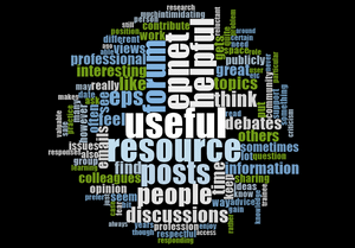Who uses EPNET and why

EPNET is a popular mailing list for Educational Psychologists (EPs) and other education professionals.
Roughly 2,800 people are signed up to the service and it serves many purposes e.g. sharing materials, discussing ideas, etc. One important function the forum is participant recruitment.
Many people (me included) have disseminated a questionnaire asking for requests for participants but there has been little in the way of research about EPNET: what kinds of people are signed up and for what reasons?
Given the prevalence of EPNET as a participant recruitment tool, asking these questions will hopefully give a better understanding of the samples one can draw from this mailing list. I therefore designed a questionnaire to explore these issues. I sent the questionnaire out in the summer of 2019 and received 314 responses. Below is a summary of some of the main findings, divided into quantitative and qualitative. All the data, code, and graphs can be found on the Open Science Framework project page.
Who participated and why they use EPNET
There were 262 self-reported females in the sample and 42 self-reported males (with 10 participants not disclosing).
Professional roles
Due of the wide variety of roles reported, the responses were sorted into broad categories.
| Roles | Number | Proportion of respondents |
| EP/Assistant EP | 188 | 60% |
| TEPs (and other students) | 62 | 20% |
| Senior and Principal EPs | 30 | 10% |
| Other psychologists e.g. Clinical | 16 | 5% |
| School workers e.g. SENCOs | 12 | 4% |
| Retired | 5 | 1% |
Around 90% of respondents to the questionnaire were already involved in the EP profession, at different career stages.
Age of respondents
The chart below shows respondents by different age brackets.
Reasons people use EPNET
With regards to the reasons people use EPNET participants could choose multiple options. The table below represents a summary of how respondents reported their use of EPNET:
For those who selected Other, the reasons given included:
- Finding CPD courses
- Keeping abreast of current issues prior to a doctorate application
- Identifying topics of interest or potential co-authors on academic papers
- Gaining a sense of community.
Role and gender differences in how EPNET is used
The main areas I will focus on are: role and gender differences between reasons for using EPNET; and how they used it (though there are many other questions that can be asked). To explore these questions, I will look at the differences between groups on reasons for using EPNET and how often they send emails to the mailing list.
My first set of analyses explored whether respondents of different roles and genders were more likely to use EPNET for certain reasons rather than others. Only one reason differed significantly by role: advertising jobs/work experience.
Looking at the expected versus observed values, EPs/Assistant EPs were more likely to advertise than expected however this appears to come from some participants reading the option as ‘looking for advertised jobs’ rather than advertising jobs themselves. There were no significant differences in reasons for using EPNET between genders.
I also wondered if there was a correlation between different reasons for using EPNET i.e. how likely a person was to select a reason given they also selected another one. I predicted that certain reasons for using the forum may be likely to occur together e.g. promoting materials and answering questions. After running a Spearman’s correlation, a few results were above 0.2 (which is classed as a small correlation). Only one of these was statistically significant – the correlation between discussing topics of interest and offering advice/asking questions. This may not be not surprising as both are active forms of engagement with the forum.
I explored how the different roles engaged with EPNET. EPs/Assistant EPs and PEPs/SEPs had a statistically significant higher median score for sending a public email (with a median of ‘Once a year’) compared with a median score of ‘Never’ for all other groups.
Men had a statistically significant higher median score for sending a public email; the median response for women sending a public email was ‘Never’ and the median for men was ‘Once a year’. However, this result should be interpreted with caution as there were far more women in the sample than men, so the men’s results are more susceptible to the influence of outliers.
There were no statistically significant gender differences for sending a private email. This suggests both men and women are just as likely to communicate privately but not publicly. This could result in male voices being more likely to be heard in the forum than female, although this may not be true as there are around 6 times as many females as males on the forum. This could therefore shape the types of content discussed and views presented, if a minority are more likely to weigh in on public discussions.
Exploring opinions about EPNET
The last question offered participant a chance to give any comments about EPNET. Of the 314 participants, 146 made a comment. A word cloud of the most frequent words (including stem words) was created using NVivo 12:

The word cloud shows that the most frequent sentiments expressed across all responses were ‘useful’, ‘helpful’, and ‘resources’. This indicates that many find the forum useful and potentially as a source of resources.
To gain a deeper understanding, I analysed the responses for key themes using thematic analysis. 6 themes were identified, with two over-arching super themes:
| Positive | Negative |
| Valuable | Intimidating |
| Knowledge | Unprofessional |
| Community | Poor interface |
Positive themes
Many respondents expressed positive views towards EPNET and stated they found it very helpful (Valuable).
Really helpful to hear from EPs outside of my own service
Valuable
Others were more specific in their praise, singling out the relevant information or resources they had received from people via the mailing list, as well as the fact they could learn from others exchanging ideas (Knowledge).
I use this as I like to stay informed of debates and emerging issues
Knowledge
For Community, all but one of the codes were positive affirmations about feeling a sense of connection with other EPs and how it helped them feel less lonely in their profession.
Lovely to see and hear from colleagues across the country and feel part of an EP community
Community
Negative themes
The vast majority of the Intimidating codings related to being put off commenting by the response to emails. Many participants expressed a fear of being attacked for giving their opinions and did not view the forum as a safe space to debate ideas.
My reluctance to actively participate is due to the sometimes rude and intimidating responses I see
Intimidating
The Unprofessional theme was a similar but distinct theme as it generally referred to any behaviour that others deemed inappropriate e.g. combative interactions or dominating the discussion.
Dominated by arsehole men a lot of the time. But then life is.
Unprofessional
Any negative comment relating to the look or usability of the mailing list was coded as Poor interface.
It’s clunky and annoying but has some useful information – would prefer a more organized forum
Poor interface
Conclusions
Of those willing to answer a questionnaire about EPNET, almost all are EPs at some stage in their career. The vast majority never comment (either publicly or privately) and the most common reasons for using EPNET were:
- watching others discuss interesting topics
- gathering resources
- gaining advice/information.
When given a chance to give their thoughts on EPNET, most expressed appreciation of the service. This is because it gives them a large pool of professional insight, resources to draw from, a sense of community, and a means of keeping up to date with developments in the field.
However, a significant number expressed dissatisfaction with a small minorities’ behaviour on the forum, stating they would like to engage more but do not feel comfortable doing so. Whilst this may not impact on the kinds of people who use EPNET passively or answer calls for participant recruitment, this does impact the types of voices that are heard on this forum. If a significant number of those who use EPNET are too intimidated to share their opinions, this potentially limits the scope of experiences shared.
Whilst the characteristics of those who are intimidated is currently unknown, I would guess that those from typically disadvantaged communities are less likely to contribute if the space is not seen as a supportive one. Whilst men are a minority on the forum and in the EP profession in general, they are more likely than women to send a public email. Because men are more likely to put their views into the public sphere, they may have an outsized impact on the forum.





[…] Who uses EPNET and why – edpsy.org.uk […]